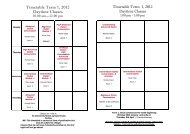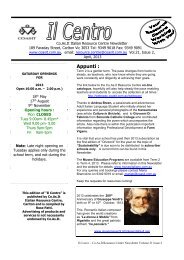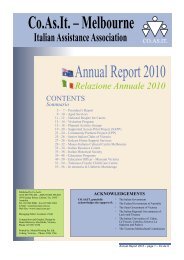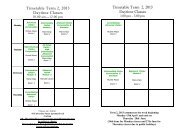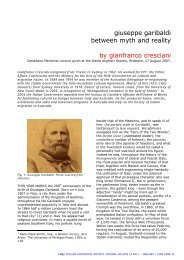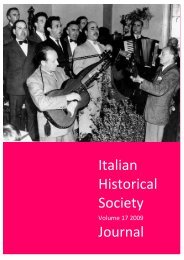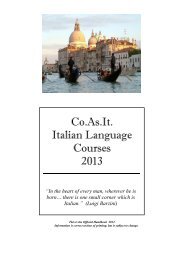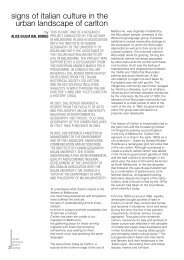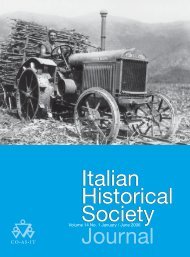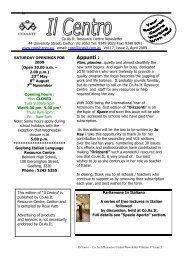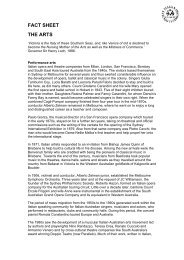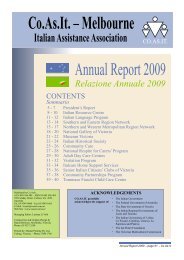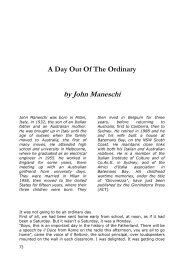January-December 2010, vol. 1
January-December 2010, vol. 1
January-December 2010, vol. 1
- No tags were found...
You also want an ePaper? Increase the reach of your titles
YUMPU automatically turns print PDFs into web optimized ePapers that Google loves.
toward a new lifeby john maneschiJohn Maneschi was born in Milan, Italy, in 1932 and moved to Australia at the age ofsixteen. He attended secondary school and university in Melbourne, where he graduated asan electrical engineer in 1955. He worked in England, the United States and Belgium, beforereturning to Australia, first to Canberra, then to Sydney. He retired in 1988 and now lives atDenham’s Beach on the NSW South Coast with his wife Jill Hassett Maneschi of 52 years.He continues to maintain close links with both his Italian and Australian relatives.“There will be Australian school for you boys, you’ll do well tospend your time on the ship studying English. Neither of youtwo knows English well enough,” had been our father’sadmonishment, spoken in his no-nonsense voice. That wastypical of our Italian papà, keen as always to address his sons’scholastic deficiencies.I was piqued. ‘Certainly I know English!’ I had protested. Englishwas my favourite subject at school. I was in the third year ofsenior high school, liceo, at the Istituto Gonzaga in Milan. Iregularly came first in class rankings for English. Perhaps mybrother Andrea, who was in the second year of the scuolamedia, needed some coaching, but not yours truly!“And I understand everything Mother says.” Mother wasAustralian and she often spoke to us in English, although weinvariably answered her in Italian.“Ha,” snorted papà, “You need much more than that, my dearboy. You might think you understand English, more or less, butthat’s not enough. You must also be able to speak, write andthink, especially think, in English. Besides, Australians have aparticular accent and idioms that you don’t know. I want bothof you to keep a diary, in English, of this voyage, which I want toread when I come to Australia.”We were talking of the Great Voyage to Melbourne, we twoboys with our mother. We were going to stay with uncles andaunts until papà followed us a year later. Australian school? Noworries, it’ll be easy, I told myself. In any case, it was all in thefuture. First we had a great adventure before us, a voyage ofone month on the ship.Preparations had begun at the beginning of the summer of1948. M/n Napoli was due to sail from Genoa in early July.Departure was then postponed to early August, and then wewere told we would sail on 6th September. The delays weredue, we were told, to industrial disputes in the ports. ForMother it was going to be the return to her native land she hadbeen pining for. For us children and for our father it was goingto be real migration. Papà had already done the ‘hard yards’ ofmigration whilst working as a young engineer in the factories ofthe Western Electric Company in Chicago. At night he wouldstudy English till late and after three years, he had a grip on boththe language and the local idioms. His firm had promoted himto Paris where he had met an Australian girl studying at theSorbonne. They had fallen in love and got married. Eventually,he succeeded in getting himself transferred to Milan, Italy,where he had become factory manager. However, it hadn’t allbeen a bed of roses. In the early days in America he’d had hisquota of anti-Italian bias on the factory floor. He chose not todivulge details, simply saying: “For you boys things will beeasier. With your mother, uncles, aunts, cousins, all Australian,you’ll be well taken care of, like being in cotton wool. You won’thave to face prejudices and ill feelings like many of those whogo there alone, not knowing the language, with no relatives, nosupport. But even you, I bet, will find, from time to time, sì comesa di sale lo pane altrui". This verse from Dante’s DivineComedy, was at that time unknown to me 1 . Papà had alwaysbeen fond of Italian literature, especially poetry. I laterdiscovered that Dante was referring to the fate of exiles, ratherthan migrants, but papà was not one to be tripped up bysubtleties.Plans to migrate to Australia had been made ten years earlier,but then war had broken out and they were abandoned. Mymother’s last visit to Australia had been in 1933 when I was twoyears old. Now, fifteen years and a World War later, her dreamof returning was about to come true. We were excited at theprospect of making the change, and the ensuing liberation fromthe chains of the Italian school routine. My companions at theGonzaga would have all gone back in October, but for us ...holidays at sea! Hence why papà’s words were like a coldshower.M/n Napoli was moored alongside the wharf in the port ofGenoa, a good looking ship of ten thousand tons, the flower ofthe Flotta Lauro, a Neapolitan shipping company. She was to befirst Italian ship to sail for Australia after the war, making it botha maiden voyage and an historical event. The owner, AchilleLauro, had acquired her from the British Royal Navy where shehad served as troop transport, and had converted her into apassenger ship.1 “How salty is alien bread”, Paradiso, Canto XVII.IHSJ ITALIAN HISTORICAL SOCIETY JOURNAL VOLUME 18 <strong>2010</strong> | 25



